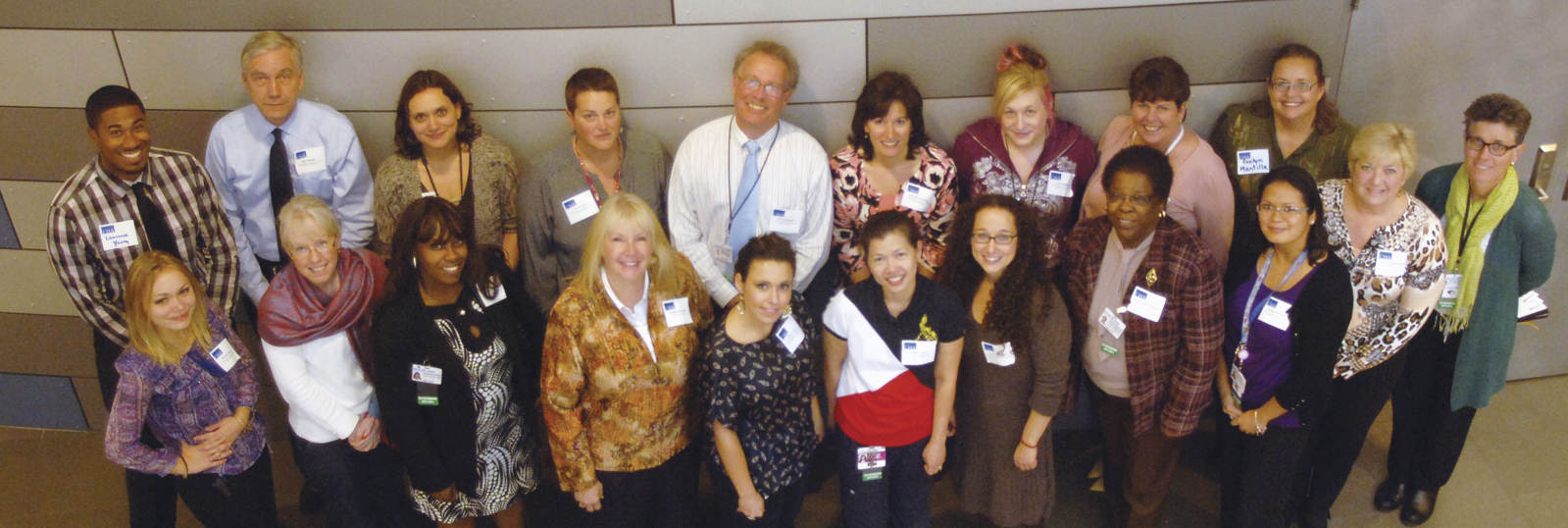By NANCY FRAZIER O'BRIEN
The community surrounding Saint Francis Hospital and Medical Center in Hartford, Conn., is 50 percent Hispanic, with a large African-American population and growing pockets of recent Asian immigrants from Bhutan, Nepal and Myanmar.

Staff members of Saint Francis Care in Hartford, Conn., take a break from diversity inclusiveness training Nov. 1 at the Saint Francis Center for Health Equity.
To help staff members learn about and adapt to each group's different needs in terms of language, culture, race and ethnicity, the Saint Francis Center for Health Equity has joined with the Hispanic Health Council and the Connecticut Hospital Association to offer a series of training sessions in cross-cultural and diversity inclusiveness.
"It's really about being an active listener," said Marisol Feliciano, who coordinates the violence and injury prevention program at Saint Francis hospital and recently underwent the training. "It's finding out what (people) really need and how we can best serve them."
At a hospital-sponsored child safety event, for example, families might come in for a simple check of whether a car seat is being used properly. But a conversation with family members might uncover other needs or concerns, Feliciano said.
The family might benefit from — but not be aware of — community outreach programs like diabetes education, prostate cancer screenings, women's heart health, tools for caregivers, lead poisoning treatment and prevention, healthy start for infants and healthy choices for adolescents. All those programs and more are offered at the Saint Francis Center for Health Equity, opened nearly a year ago on the first floor of a building owned by the Urban League of Greater Hartford.
Rev. Marcus McKinney, vice president for community health equity and health policy at Saint Francis Care, the integrated health delivery system established by the 116-year-old hospital, said the training developed from a resolution passed by the Saint Francis Care board in 2011.
Citing recommendations from CHA, the American Hospital Association, the U.S. Department of Health and Human Services and others, the resolution set three "health equity goals" — increased diversity in governance and management; more cultural competency training of clinicians and support staff; and better collection and use of race, ethnicity and primary language data.
"Addressing health disparities begins with education," said Rev. McKinney, an ordained Baptist minister who holds a doctorate in psychology. "We cannot begin to resolve health disparities until we know the communities we are trying to serve. Better conversations between health care providers and patients lead to better outcomes."
He said the Saint Francis Center for Health Equity — which includes the Curtis D. Robinson Men's Health Institute, the Innovation and Learning Center, the Connecticut Institute for Primary Care Innovation and a primary care team for the neighborhood — "allows us a physical plant to do many things that hospitals don't always do well in an urban environment."
Rev. McKinney said the center's goals are to "strengthen diversity, respond to health needs identified in the community and support all of our employees with culturally appropriate models of care." Stronger ties among practitioners, patients and community leaders "will help shape a more trusting model of care, from prevention to post-hospitalization," he said.
Toward that end, the diversity training for hospital employees begins by asking participants to describe their family's own cultural and religious background and how that background might have given rise to certain traditions, expectations and even "beliefs about how a person gets sick and gets well," he said.
At the hospital, there are "lots of wonderfully trained people who have expertise, who have been told through lots of study about what they should do when a person has a cough," Rev. McKinney said.
But a conversation about what a person believes can provide comfort that promotes healing, he added. "Sometimes a warm compress on (the) belly could reassure a child and with this ‘medicine' you can honor a family practice."
Jose Ortiz, president and chief executive of the Hispanic Health Council, which developed the cross-cultural and diversity inclusiveness training program, said the training aims to "provide the foundation of knowledge, attitudes and skills for effective interaction with diverse patient populations.
"The development of cultural competence is a profound, lifelong journey that involves profound transformation of individuals and the institutions in which they work," he added.
Feliciano said the training has an additional benefit in bringing together Saint Francis staff members who might not interact on a regular basis.
"We were all from different job descriptions, and it was interesting in that safe-zone environment to discuss what we think about things that are sensitive and how that affects us," she said.
Copyright © 2014 by the Catholic Health Association
of the United States
For reprint permission, contact Betty Crosby
or call (314) 253-3477.